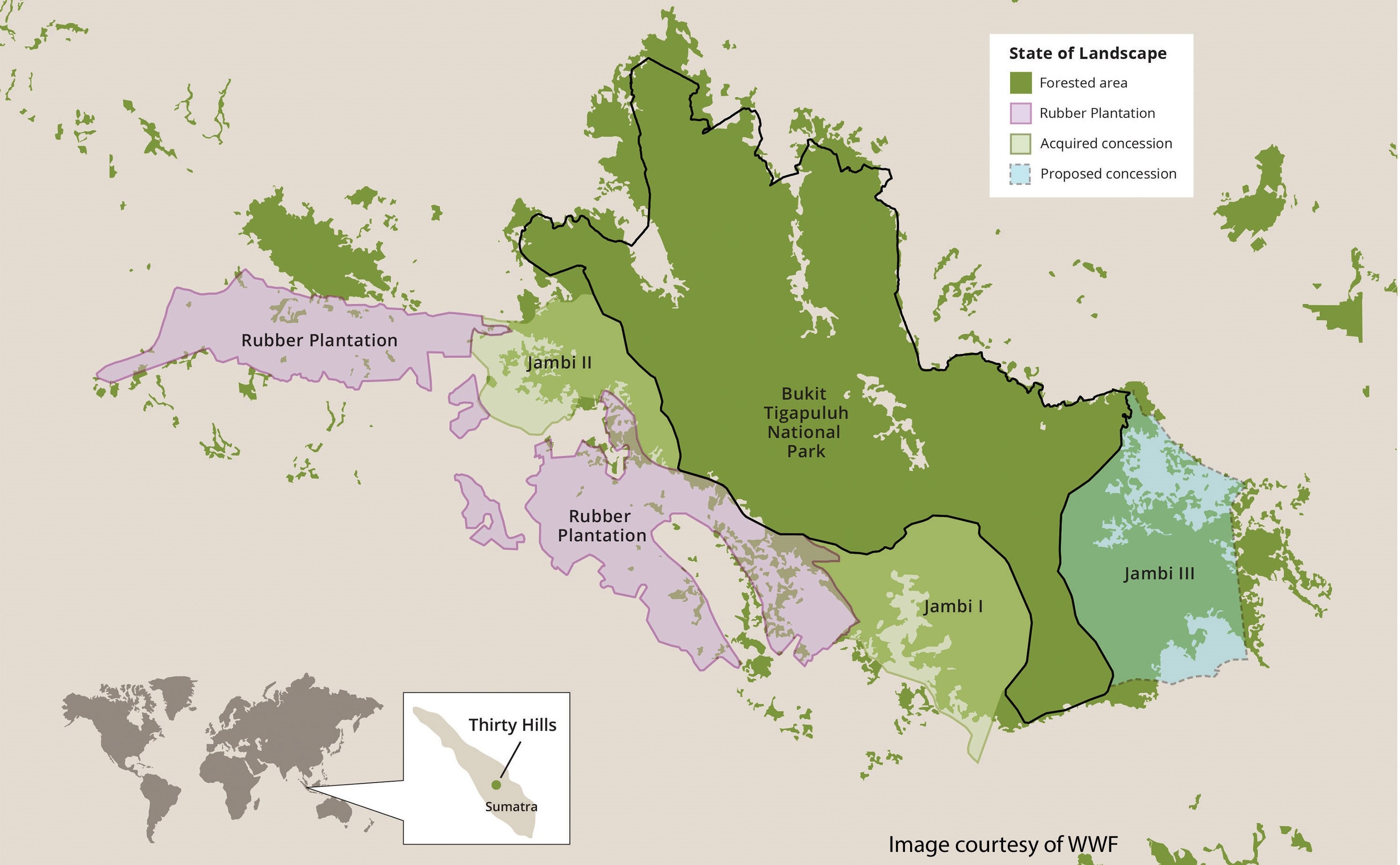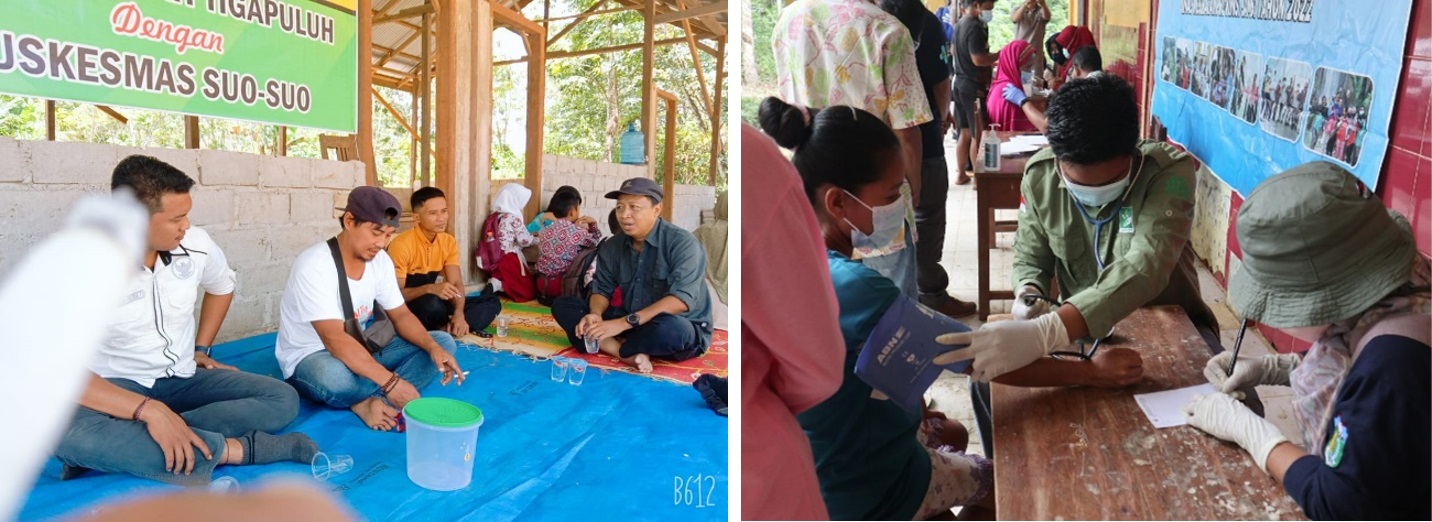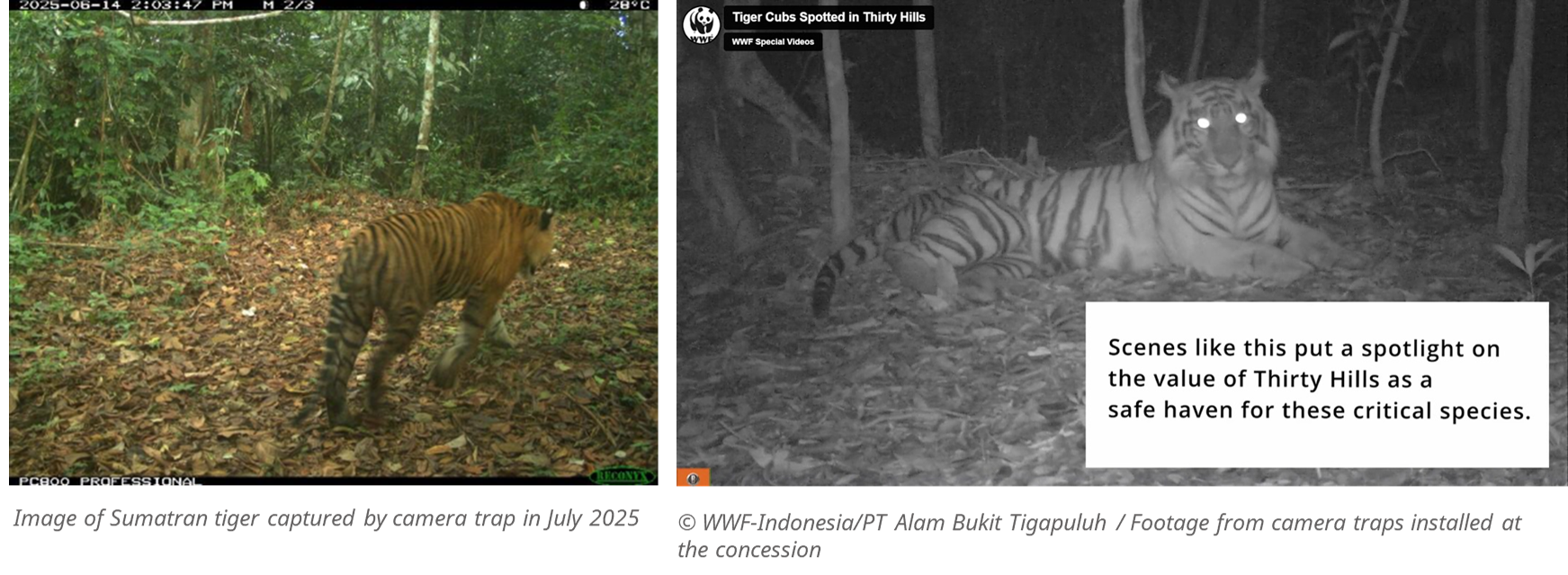Updated on 26 November 2025
Bank of Singapore is proud to be a sponsor of WWF’s conservation project in Sumatra, Indonesia from 2023 to 2025 together with other funding partners. Known as the Thirty Hills Ecosystem Restoration Concession Initiative, the sponsorship contributes towards the goal of protecting over 38,000 hectares of rainforest in the Bukit Tigapuluh Ecosystem Restoration Concession, including 6,500 ha dedicated to reforestation.
Through this initiative, Bank of Singapore also aims to create awareness amongst its employees and clients on issues relating to conservation and climate action.
This sponsorship was not the only shared initiative between Bank of Singapore and WWF. In 2021, the Bank collaborated with WWF to pilot a newly developed sustainability e-learning module under the WWF ASFI Academy, which was extended to all Bank of Singapore employees globally before the program was rolled out to the broader private banking sector. As a continuation of this initiative, Bank of Singapore leveraged their contribution to educate its employees on forest conservation.
Sumatra's last stand: The quest to protect a vital ecosystem and its inhabitants
The Bukit Tigapuluh landscape in Indonesia – also known as “Thirty Hills” – represents a critical area for ecosystem preservation and restoration, with far-reaching benefits for climate change mitigation, the conservation of biodiversity and natural resources, as well as the indigenous communities who call it home.
“As a forest concession company, PT Alam Bukit Tigapuluh stands at the forefront of ecosystem restoration. Together with our valued donors, we are planting the seeds of transformation. Yet, to truly scale up our conservation impact, we recognize the pivotal role of the private sector. Their support is the cornerstone upon which we'll build a sustainable future for the environment and our communities, creating a legacy of restoration and biodiversity for generations to come.”
This invaluable asset requires collaborative effort and a united front from its diverse stakeholders to ensure its enduring ecological integrity. Together with the Frankfurt Zoological Society (FZS) and The Orangutan Project (TOP), WWF founded PT Alam Bukit Tigapuluh (PT ABT), a concession company focusing on safeguarding the integrity of intact forests and breathing life back into deforested or degraded areas within the concession.
Climate change mitigation: The landscape comprises the largest remaining block of intact, lowland forest in central Sumatra, Indonesia, storing an estimated 11.5 million metric tons of carbon dioxide equivalent (MtCO2e). Rainforests are known as carbon sinks and play a vital role in mitigating climate change by absorbing carbon dioxide from the atmosphere and storing carbon in their biomass and soil, thus reducing carbon emissions resulting from human activities.
Conservation of biodiversity and natural resources: While being home to some of the world’s most iconic and critically endangered species, including Sumatran tigers, orangutans, and elephants, the Indonesian Island of Sumatra is also a deforestation hotspot. Forest loss and degradation are pushing these magnificent species to the brink of extinction. Protecting and restoring this landscape safeguards not only the forest, but also countless ecosystem services, biodiversity, as well as the culture and livelihoods of the Indigenous peoples and local communities who call this place home.
Sustainable livelihoods for indigenous communities: The Talang Mamak and Orang Rimba are the two indigenous tribes living in the area that rely on forest resources for their livelihoods. Working alongside these communities to protect and restore this landscape ensures their access to these critical resources, while opening up conversations on sustainable business practices that can be implemented by the communities.

Through its Ecosystem Restoration Concession (ERC), PT ABT seeks to achieve the following goals:
Progress to date
The following progress was made possible with the support from Bank of Singapore and other donors.
Reforestation by natural regeneration, enrichment and replanting in priority areas
The implementation of reforestation activities has shown remarkable progress. As of today, 537.98 hectares of degraded forests have been restored through reforestation efforts. The replanting efforts – focused on areas and zones previously affected by fires will continue to take place with the support from various local partners and community members.
© PT Alam Bukit Tigapuluh
Community health support
To enhance healthcare accessibility for the communities residing within and around the concession area, a close collaboration with the Suo Suo Community Health Center has been established, facilitating regular medical visits to three distinct locations monthly. To date, over 1,700 community members from two villages have received free health services through regular medical visits. This approach underscores the unwavering commitment to fostering harmonious relations with local communities and ensure their well-being as integral partners in the conservation and restoration efforts.

© WWF-Indonesia/PT Alam Bukit Tigapuluh / Monthly health visit to community living within and around ABT concession
Reducing deforestation through regular patrols
In an effort to curb deforestation, a robust system of regular patrols, led by a dedicated Forest Protection and Security Personnel (PPH) has been implemented in 2023 to safeguard the concession. Comprised of 43 personnels, PPH plays a critical role in providing timely intervention and faster response, reducing deforestation by 90% since the start of the project and increasing patrol intensity by more than 70%. In parallel, community engagement to educate local communities on the importance of forest preservation and activities prohibited within state forest zones continue to be a priority.
Sustainable business development for the long-term protection of forest resources
Supporting local communities in developing sustainable business practices is a central objective of the concession. The harvesting or cultivation of locally grown commodities such as Sialang honey and natural rubber have been implemented to support sustainable livelihoods of the local communities due to their market value. PT ABT will maintain its collaboration with KTH (Kelompok Tani Hutan or forest farmer groups) in order to establish quality standards and ensure fair compensation. A sustainable business plan for PT ABT has also been developed to identify and quantify potential revenue streams of the concession and devise an implementation road map to operationalise the business model in a way that brings tangible benefits to the local communities.
Biodiversity conservation in the ecosystem restoration concession
Sumatra has hundreds of wildlife species (thousands if you include insects), including 200 mammals and nearly 600 bird species. Between 2023 and 2025, a total of 48 camera traps were deployed to monitor wildlife activities within the concession. This has provided a glimpse of the rich biodiversity within the concession area, capturing remarkable scenes such as a Sumatran tiger and her two cubs, orangutans and elephants.

Over the past two years, WWF has witnessed effective execution of workplans and activities, albeit not without its share of challenges. The persistence of isolated fires and community conflicts remain the two biggest challenges to the restoration activities, particularly the planting initiatives and concession boundary demarcation process. Contributions from partners committed to enhancing nature resilience are critical to safeguard Southeast Asia’s ecosystems. Through sponsorships from organisations like Bank of Singapore, WWF is dedicated to furthering the restoration efforts within the concession, taking action to mitigate climate change, improving indigenous peoples and local communities' livelihoods, as well as curbing biodiversity loss.

Source of information and data points: WWF-Singapore
Note: The Bank is not responsible for the accuracy or completeness of the information provided by any external presenters which may change without prior notice. The external presenters may hold views which are not representative of the views of the Bank, and such views may have been derived without discussion, consultation or agreement with the Bank. You will need to decide as to whether or not the contents are suitable for you. When you are in doubt, please seek your own independent financial, legal, tax or other advice as you deem fit. Neither the Bank nor any of its officers accept any liability for any loss whatsoever arising out of or in connection with your use of the information in the presentation.